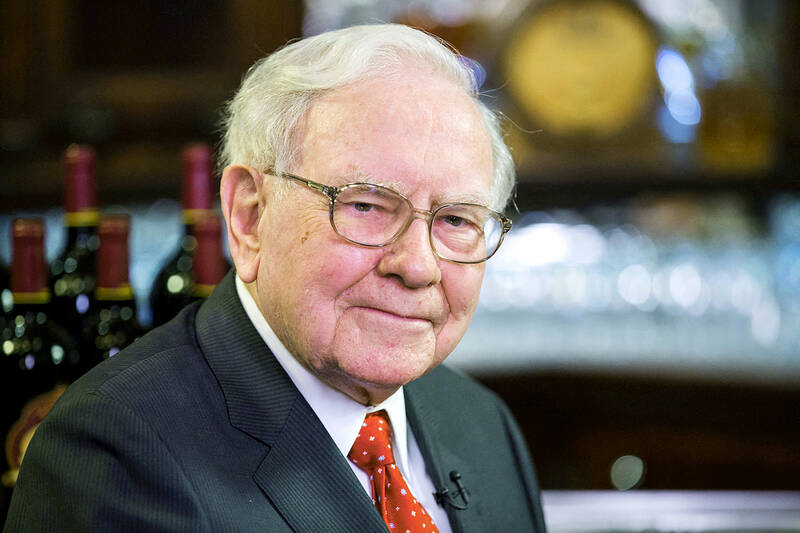Warren Buffett said he prefers deploying capital in Japan instead of Taiwan, lamenting how geopolitics led his firm to cut stakes in the nation’s chipmaker giant.
Taiwan Semiconductor Manufacturing Co (TSMC, 台積電) is one of the best-managed and most important companies in the world, Buffett said at Berkshire Hathaway Inc’s annual general meeting in Omaha, Nebraska, on Saturday.
“There’s nobody in the chip industry that’s in their league,” he said.

Photo: Reuters
That did not stop Berkshire from slashing its holding in TSMC by 86 percent during the fourth quarter of last year, after reporting a US$5 billion investment in November last year — a move Buffett has blamed on rising tensions between Taiwan and China.
Buffett urged China and the US to keep a lid on their rivalry.
“It’s imperative that China and the United States both understand what the game is, and that you can’t push too hard,” he said at the meeting. “Both places are going to be competitive and both can prosper.”
Speaking at the same event, Buffett’s longtime business partner Charlie Munger called for “reciprocal kindness” between the two superpowers.
In Taipei, Deputy Minister of Economic Affairs Lin Chuan-neng (林全能) said at a meeting of the legislature’s Finance Committee yesterday that the government would strive to let the world know that Taiwan is safe and stable.
TSMC would continue to spur technological development in Taiwan and maximize synergy in the nation, Lin said.
“Geopolitical developments cannot be controlled, but the government will continue to maintain TSMC’s core competitiveness in Taiwan and create the value of TSMC in the global industrial chain,” the Central News Agency (CNA) quoted Lin as saying.
National Development Council Deputy Minister Shih Keh-her (施克和) at the same meeting said that Buffett’s remarks represent an investor’s opinion, part of which affirms TSMC’s key role in the global supply chain, while also emphasizing the importance of Taiwan’s security, CNA reported.
Meanwhile, Buffett signaled a willingness to make further investments in Japan after recently raising stakes in trading companies there.
Berkshire owns 7.4 percent of those businesses, but would not go over 9 percent, he said.
Greg Abel, the heir apparent to Buffett who joined him on a trip to Japan last month, called them “an incredible” investment.
Buffett said he wanted to introduce Abel to executives from the five trading houses, recognizing that there would be continued investments and relationships there.
Japan’s trading houses — or sogo shosha — have deep roots in the country’s economy, dating back hundreds of years, and provide everything from food to energy.
“The Japanese thing was simple,” Buffett said. “I like looking at companies. I like looking at figures about companies.”
Additional reporting by staff writer

Taiwan Semiconductor Manufacturing Co (TSMC, 台積電) would not produce its most advanced technologies in the US next year, Minister of Economic Affairs J.W. Kuo (郭智輝) said yesterday. Kuo made the comment during an appearance at the legislature, hours after the chipmaker announced that it would invest an additional US$100 billion to expand its manufacturing operations in the US. Asked by Taiwan People’s Party Legislator-at-large Chang Chi-kai (張啟楷) if TSMC would allow its most advanced technologies, the yet-to-be-released 2-nanometer and 1.6-nanometer processes, to go to the US in the near term, Kuo denied it. TSMC recently opened its first US factory, which produces 4-nanometer

PROTECTION: The investigation, which takes aim at exporters such as Canada, Germany and Brazil, came days after Trump unveiled tariff hikes on steel and aluminum products US President Donald Trump on Saturday ordered a probe into potential tariffs on lumber imports — a move threatening to stoke trade tensions — while also pushing for a domestic supply boost. Trump signed an executive order instructing US Secretary of Commerce Howard Lutnick to begin an investigation “to determine the effects on the national security of imports of timber, lumber and their derivative products.” The study might result in new tariffs being imposed, which would pile on top of existing levies. The investigation takes aim at exporters like Canada, Germany and Brazil, with White House officials earlier accusing these economies of

Teleperformance SE, the largest call-center operator in the world, is rolling out an artificial intelligence (AI) system that softens English-speaking Indian workers’ accents in real time in a move the company claims would make them more understandable. The technology, called accent translation, coupled with background noise cancelation, is being deployed in call centers in India, where workers provide customer support to some of Teleperformance’s international clients. The company provides outsourced customer support and content moderation to global companies including Apple Inc, ByteDance Ltd’s (字節跳動) TikTok and Samsung Electronics Co Ltd. “When you have an Indian agent on the line, sometimes it’s hard

PROBE CONTINUES: Those accused falsely represented that the chips would not be transferred to a person other than the authorized end users, court papers said Singapore charged three men with fraud in a case local media have linked to the movement of Nvidia’s advanced chips from the city-state to Chinese artificial intelligence (AI) firm DeepSeek (深度求索). The US is investigating if DeepSeek, the Chinese company whose AI model’s performance rocked the tech world in January, has been using US chips that are not allowed to be shipped to China, Reuters reported earlier. The Singapore case is part of a broader police investigation of 22 individuals and companies suspected of false representation, amid concerns that organized AI chip smuggling to China has been tracked out of nations such